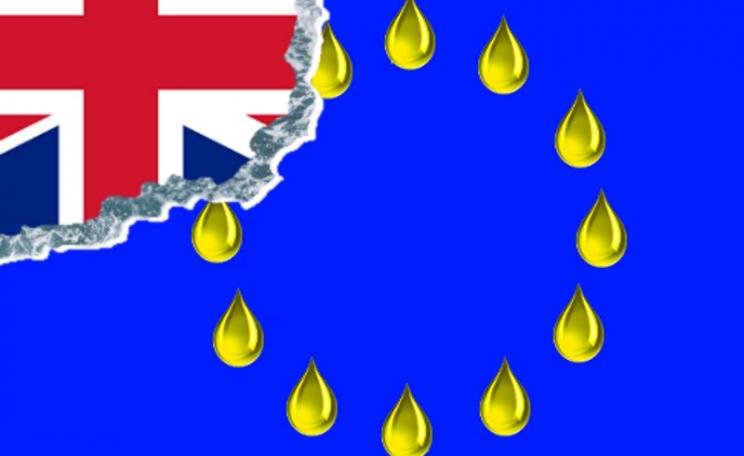Given that the European treaties are already a compromise reached after extremely ferocious negotiations, an 'other Europe' is simply an illusion.
I am a supporter of political ecology. I consider that a controlled shift to a sustainable economic regime is needed to prevent an uncontrolled global decline, if not collapse, forced by events.
The required drastic reduction in the environmental impact of our activities implies soberer modes of consumption, a shift away from fossil fuels, a scaling down of distribution networks (i.e. de-globalisation), more circularity (reuse, recycling) and a stabilisation of world population.
However, one can only observe very little change at the national or international level.
As strong regulations are necessary for the changes to occur, the current ideological framework of globalised free markets cannot bring about the necessary changes.
Indeed, profit and growth are the main goal, resulting in more environmental impact and pollution. We therefore need a new ideological paradigm underlying the organisation and goals of our societies.
The EU: undemocratic, regressive and ideologically locked by law
The EU enjoys a progressive image in most European countries, including Britain. It is however essential to bear in mind that the EU is first and foremost about freeing the markets and increasing productivism rather than social and environmental welfare.
In fact, productivism and globalisation are enshrined into the Lisbon treaty.
For instance, Articles 32 and 63 of the Treaty on the Functioning of the European Union prevent Member States from protecting themselves from third countries where social and environmental requirements are lower and therefore production costs are cheaper.
They also encourage large distances between production and consumption locations. Article 39 on agriculture and fisheries does not state that the objectives are to produce food while limiting the damage to the environment or to ensure the high quality of the products.
The objective is rather to "increase agricultural productivity" by "promoting technical progress" and to optimise the "factors of production, in particular labour."
Additionally, it should be noted that EU citizens have very little - if any - control over the policies, new treaties or new enlargements that the EU pursues.
Would a stronger EU be more progressive?
Some may object that a stronger Union is needed for the EU to be able to apply more progressive policies. However, there is no indication today that the underlying ideology will be ever questioned in a future treaty.
On the contrary, the new Transatlantic Trade and Investment Partnership (TTIP) between the US and the EU, secretly being prepared for us, is going to go even further in freeing the markets and giving leeway to multi-nationals.
Given that the European treaties are already a compromise reached after extremely ferocious negotiations, an 'other Europe' is simply an illusion.
This is leading to fears about a downgrading of the social and environmental regulations and about making the policy implications of environmental research entirely irrelevant.
A stronger Union thus means going further in the same direction.
Others argue that a different Europe is possible. However, for a radical shift in policies to happen, all 28 Member States have to agree unanimously and simultaneously to change the treaties under the new terms.
Given that these treaties are already a compromise reached after extremely ferocious negotiations, an "other Europe" is simply an illusion.
What is possible, however, is to withdraw from the EU by virtue of Article 50 of the Treaty on European Union. The EU is what it is and cannot be recreated: take it or leave it.
The risk of deeper liberalism in an independent Britain
There is, however, the risk that leaving the EU will aggravate neo-liberalism inside the UK. Indeed, Britain has often been pushing the EU to keep its hands off the economy.
In January, the UK lobbied the Commission and succeeded in aborting further control on fracking activities. It also appears to be responsible for the watering down of the revised Markets in Financial Instruments Directive ("MiFID II"), whose aim is (or was) to regulate the financial system, for instance to limit speculation on food prices.
It is true that the EU, until now, has acted as a restraining force in front of British right-wing anti-environmentalism and neo-liberalism.
However, it should be noted that the successful lobbying of the UK and the trend that the EU is taking (see e.g. its disappointing CO2 targets and its progressive authorisation of GM usage) indicate that this restrain is only superficial and will not last.
"It's a right-wing thing"
One difficulty in many European countries, including Britain, is that the idea of withdrawing from the EU is associated with very conservative or exacerbated nationalistic ideologies, as exemplified by the vocal UK Independence Party (UKIP) and the British National Party.
Both are also sceptical about climate change. In particular, UKIP does "not regard CO2 as a pollutant" and criticizes the EU for distorting the energy market (through the Emission Trading Scheme, and subsidies and feed-in tariffs for renewables) and for preventing the UK from restoring its coal industry.
Similarly, Conservatives are also associated with moderate EU, as well as climate change, scepticism. However, the desire to leave the EU is perfectly separable from these ideological stances.
EU withdrawal should instead be seen as a way for the people to regain control over the economic, social and environmental policies applied in their own countries, and to avoid being trapped inside the one-track ideology of an international oligarchy.
As a consequence, the potential referendum should not be seen as a way to express one's view about the party proposing the vote, but merely as an opportunity to allow radically different society projects to happen.
Anti-EU progressive movements
In order to show to rulers that the desire to leave the EU is not necessarily a call for neoliberal, conservative or far right policies, progressive movements have to organise themselves to weight in the debate.
They should educate people on the ideological prison that the EU treaties represent. They should apply pressure on moderate and left wing representatives to also call for a referendum if they get into power or, better, get organised themselves as a political party.
In France, for instance, the Union Populaire Républicaine (UPR, Popular Republican Union) is becoming increasingly popular. Most importantly, it is a moderate movement calling for radical political changes impossible within the EU.
For instance, it wants to renationalise former State companies, ban GM foods and favour local food production while guaranteeing self-sufficiency of the country.
A British equivalent?
In Britain, an equivalent may be the cross-party organisation Campaign for an Independent Britain, which, as its name indicates, focuses solely on withdrawal from the EU.
On 1st December 2013 in Athens these organisations signed a joint communiqué with eight other European organisations pursuing the same goal, stating that the EU is an undemocratic regime under the "dictatorship of the markets".
People across the Union are therefore starting to realise the EU aggravates their loss of control over the decisions taken inside their own country.
Leaving the EU is of course far from being sufficient: a controlled shift of the economy to environmental sustainability will require strong political will and great strides in popular education.
We cannot be sure that leaving the EU will in itself result in a better response to the challenges of the 21st century, but what is almost certain is that without leaving the EU, there is no hope of any ideological shift.
David Acunzo has a PhD from The University of Edinburgh and is a graduate in Environmental Management and Engineering from ISIGE Mines ParisTech and Tsinghua University. He writes at Turning Points and tweets at @DavidAcunzo
He extends his thanks to Jocelyn Timperley for her comments and corrections on the article.




